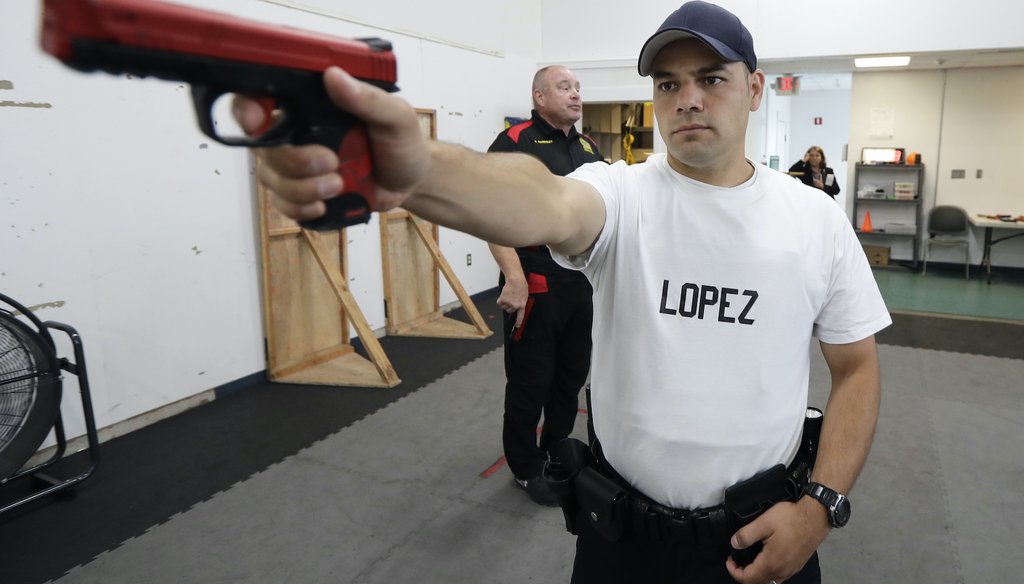

Our only agenda is to publish the truth so you can be an informed participant in democracy.
We need your help.


In this July 16, 2019, photo, Fernando Lopez, of the Othello Police Department in Othello, Wash., holds a training gun as he takes part in a firearms defense class as part of Washington state's Basic Law Enforcement Academy in Burien, Wash. (AP)
In Wisconsin, cosmetologists are required to put in more time for training than police.
But aspiring officers must have an associate’s degree (at hiring, or finished within their first five years) for a position, something not required for a cosmetology license.
Officers must also undergo a medical assessment, background check and drug test.
Editor's note: This item was updated to reflect that officers may be permitted up to five years to attain an associate's degree. This does not change our rating.
Police are under a national microscope after a Kenosha officer repeatedly shot a Black man in the back.
A video of the Aug. 23, 2020, incident circulated widely on social media appeared to show a Kenosha police officer grabbing Jacob Blake by the back of his shirt as he tried to get into a small SUV before an officer shot Blake seven times at point-blank range. Three of Blake’s children were in the vehicle.
The shooting, which paralyzed Blake from the waist down, provoked protests in Kenosha and across the country over police brutality and its disproportionate impact on Black people. It also renewed criticism of police departments, which some say are overfunded and do not adequately train officers.
An Aug. 24, 2020, Facebook post shared more than 1,300 times underscored that message.
"Police training in Wisconsin is 21 weeks," the post said. "A cosmetology license takes 40 weeks."
This post was flagged as part of Facebook’s efforts to combat false news and misinformation on its News Feed. (Read more about our partnership with Facebook.)
Is the post correct about the imbalance?
In Wisconsin, both police officers and cosmetologists must undergo training before they can assume the job. But the processes are very different.
According to the state Department of Safety and Professional Services, applicants for a cosmetology license must complete at least 1,550 hours — or about 39 weeks if you assume 40 hours per week — of training at a licensed cosmetology school. The program must last a minimum of 10 months.
Alternatively, aspiring cosmetologists can take two to four years to complete at least 4,000 hours of practical training and theoretical instruction through an apprenticeship. They must also have a high school diploma or the equivalent of one.
Approved candidates must then pass a practical and written exam, which can take up to 6.5 hours altogether. Those who succeed and meet all other requirements receive a license.
So, depending which measure you use, the Facebook post is either about right or vastly understated the amount of time required to obtain a cosmetology license.
It also doesn’t tell the full story about police training.
As of 2016, anyone who applies to be a law enforcement officer or tribal law enforcement officer in Wisconsin must undergo 720 hours, or 18 weeks, of training — even less than what the Facebook post claimed. The training curriculum for jail and juvenile detention officers is 160 hours.
According to a document from multiple statewide law enforcement groups, the 720-hour academy includes written exams, 40 hours of scenario-based evaluations and training on ethics, cultural competency and racial sensitivity.
However, training is only one part of the puzzle. Unlike cosmetologists, law enforcement officials employed after 1993, excluding jail and juvenile officers, must have an associate’s degree or at least 60 accredited college credits -- or attain one within five years. They must also undergo a medical assessment, background check, oral interview and drug test.
The Facebook post doesn’t factor in the degree requirement, which is a key difference in this comparison. Cosmetology training can begin right out of high school, while police officers typically would first complete at least a two-year degree.
The post also doesn’t acknowledge the 24 hours of annual training officers must undergo to remain in law enforcement. Cosmetologists, by contrast, are no longer required to participate in continuing education and must read a digest of rule changes that occurred during the biennium when they renew their license.
The Facebook poster did not respond to a request for comment.
A widely-shared Facebook post in the aftermath of Blake’s shooting by Kenosha police said: "Police training in Wisconsin is 21 weeks. A cosmetology license takes 40 weeks."
When you look only at training, cosmetologists are required to put in more time than police officers. The numbers in the Facebook post are slightly off and actually understate the gap, but the underlying point still stands.
That said, the post doesn’t account for the additional education requirements needed to become a police officer, nor the assessments they must undergo before they even begin training.
That leaves us with a statement that’s partially accurate but leaves out important details or takes things out of context.
We rate this Half True.
Milwaukee Journal Sentinel, 'He was not treated like a human that day': Family of Jacob Blake, now paralyzed, speaks out on police shooting, Aug. 25, 2020.
Wisconsin Department of Safety and Professional Services, Cosmetologist, accessed Aug. 26, 2020.
Wisconsin State Legislature, Statute 454.10, accessed Aug. 26, 2020.
D.L. Roope, Wisconsin Cosmetologist Candidate Handbook, accessed Aug. 26, 2020.
WILENet, Wisconsin Law Enforcement Standards Board Policy & Procedures Manual, June 7, 2017.
City of Wauwatosa, Key Points and Background on the Training of Wisconsin Law Enforcement Officers, accessed Aug. 26, 2020.
Wisconsin Department of Safety and Professional Services, Cosmetologist Continuing Education, accessed Aug. 27, 2020.
In a world of wild talk and fake news, help us stand up for the facts.
